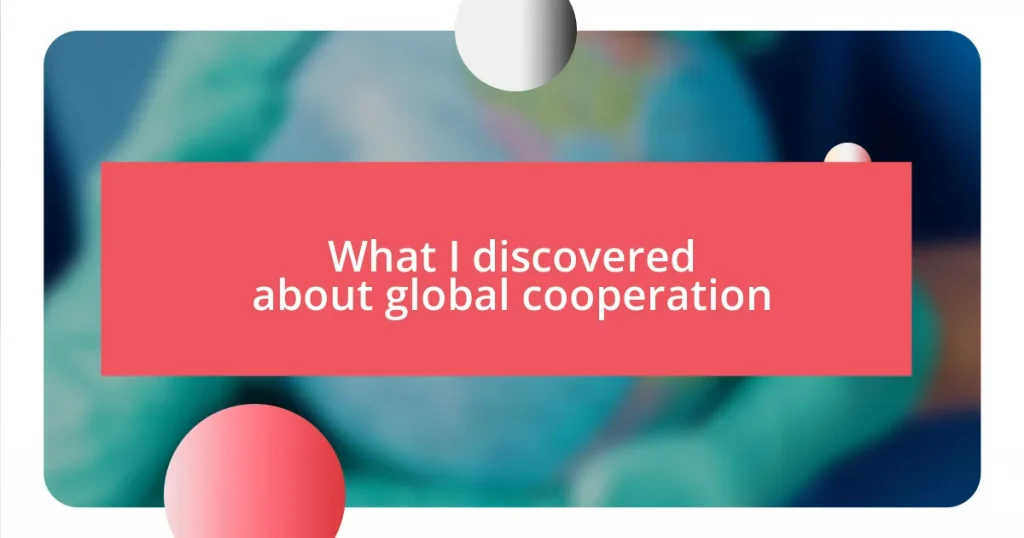Key takeaways:
- Global cooperation fosters innovative solutions through shared knowledge, enhances economic growth via trade partnerships, and promotes a sense of belonging across cultures.
- Historical milestones, such as the founding of the United Nations and key treaties, illustrate the evolution and necessity of international collaboration.
- Future trends in global partnerships will focus on technology, sustainability, and inclusivity, emphasizing clear communication and collaborative efforts to address global challenges.
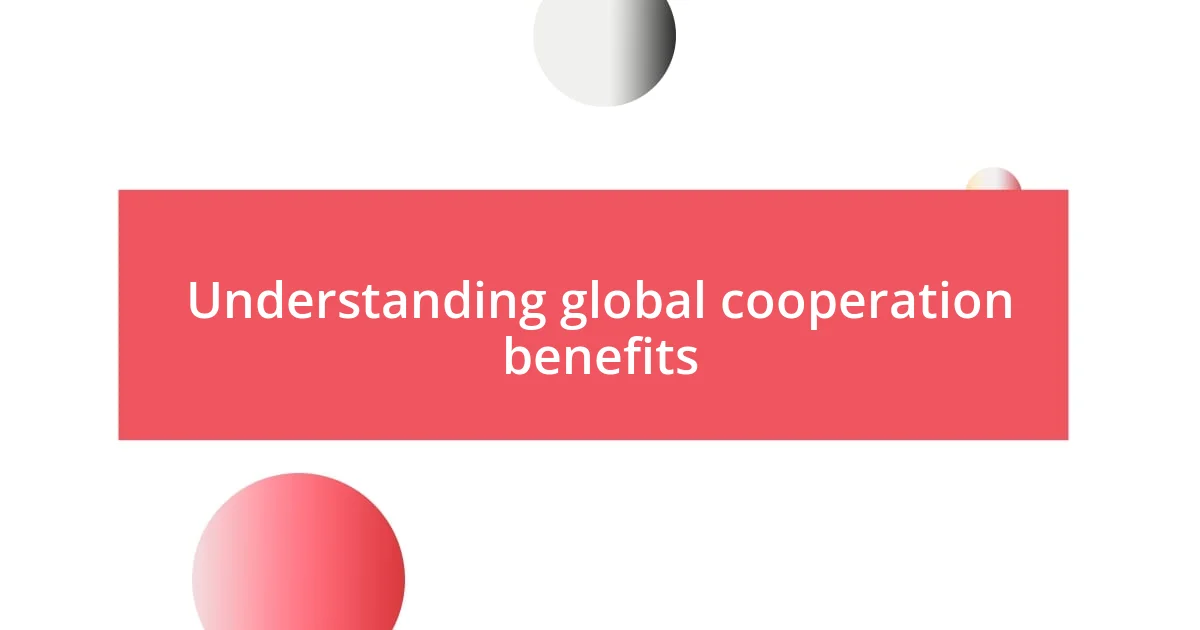
Understanding global cooperation benefits
One of the most profound benefits of global cooperation is the power of shared knowledge. I remember attending an international conference where experts from diverse fields exchanged ideas about climate change. It struck me how collaboration across borders not only led to innovative solutions but also fostered friendships born from a common goal—saving our planet. Isn’t it inspiring to think about how our collective wisdom can tackle issues that seem insurmountable when faced alone?
Moreover, global cooperation helps create a sense of belonging in an interconnected world. During my travels, I’ve experienced the warmth of coming together with people from different cultures, all rallying around a shared cause. It brought me joy to realize that, despite our differences, there’s something inherently human that unites us—our ability to empathize and work together towards the greater good. How often do we forget that our shared humanity is our greatest asset?
Finally, let’s not overlook the economic advantages of global cooperation. I saw firsthand how countries partnering for trade agreements could bolster local economies, creating job opportunities and raising living standards. When we collaborate, we open ourselves up to new markets and innovative products that can enhance our everyday lives. Isn’t it fascinating how working together can lead to prosperity for everyone involved?
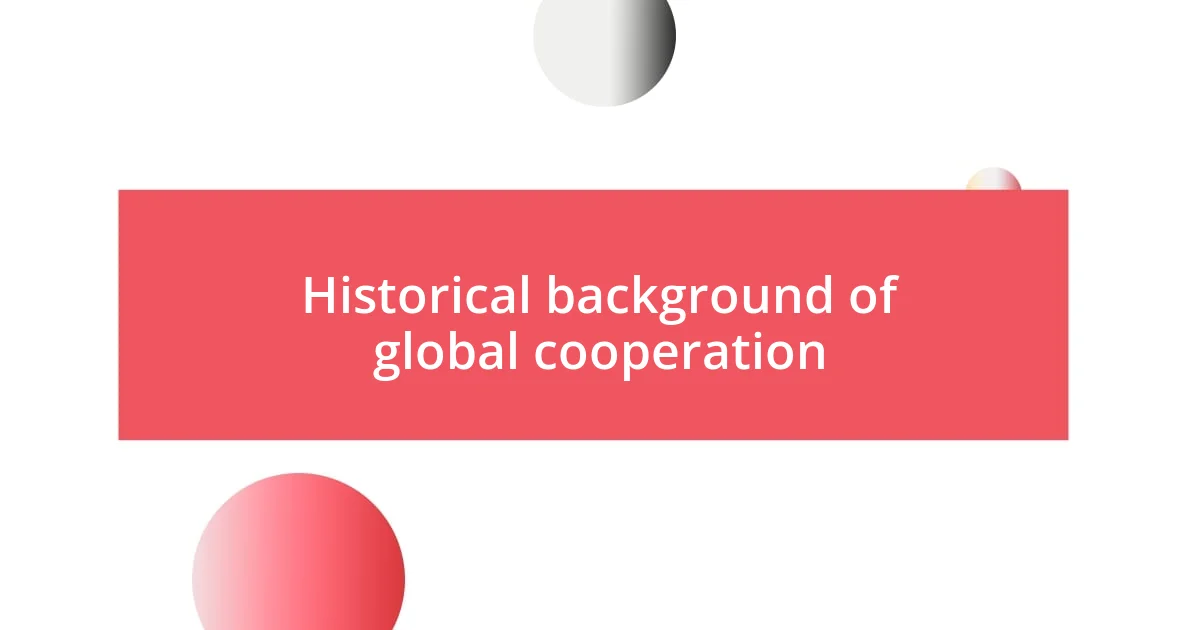
Historical background of global cooperation
Global cooperation has a well-documented history that dates back centuries, with notable milestones shaping its trajectory. I often reflect on key agreements like the Treaty of Westphalia in 1648, which ended the Thirty Years’ War and laid the groundwork for modern nation-states. It’s fascinating to see how this moment emphasized the importance of diplomatic negotiations and helped catalyze international relations as we know them today.
- The establishment of the United Nations in 1945 marked a significant turning point, bringing together countries to promote peace and prevent conflicts.
- The formation of organizations such as the World Health Organization (WHO) in 1948 showcased a collective commitment to tackling global health issues.
- Over time, trade agreements and climate accords like the Paris Agreement in 2015 have further illustrated the necessity of nations working hand-in-hand.
Reflecting on these developments, I sometimes think of how I first learned about the importance of international treaties while visiting a historical site. Standing amidst the remnants of a gathering that changed the course of history, I could almost feel the weight of the decisions made there. It was a moment of realization for me—cooperation has always been a part of our evolution, weaving our stories together across borders and cultures.
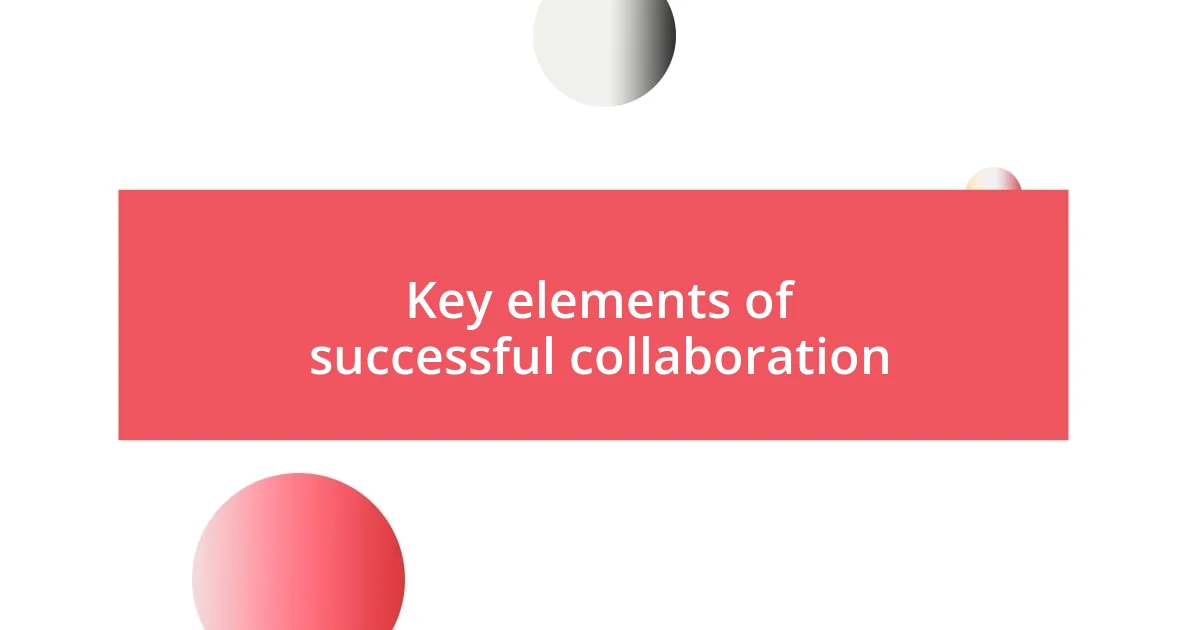
Key elements of successful collaboration
Collaboration thrives on trust; it’s the bedrock of any successful partnership. I recall a project I worked on, where establishing trust was essential. We had to rely on each other’s expertise, which required open communication and honesty. When we started sharing our thoughts candidly, I noticed how our collaboration transformed from mere task delegation into a genuine synergy that propelled us forward.
Open communication also plays a critical role, allowing ideas to flow freely. During another international project, I remember we faced a major obstacle due to misunderstandings. By instituting regular check-ins and utilizing collaborative tools, we cleared the air and were able to share insights in real-time. The difference was palpable—the connections deepened, and together we could innovate solutions that none of us could’ve developed alone. It was a powerful reminder of how communication fosters creativity.
Lastly, adaptability is key in any collaborative endeavor. I experienced this during a cross-cultural workshop where each participant had different expectations and working styles. By being open to adjustments and embracing varied perspectives, our team not only navigated challenges but thrived. This adaptability enriched our collaboration, leading to outcomes that exceeded our original goals. Isn’t it incredible how flexibility can turn potential conflicts into opportunities for growth?
| Key Element | Description |
|---|---|
| Trust | Building trust fosters strong relationships and encourages candor. |
| Open Communication | Facilitating idea exchange nurtures creativity and innovation. |
| Adaptability | Being flexible allows teams to navigate challenges and grow together. |
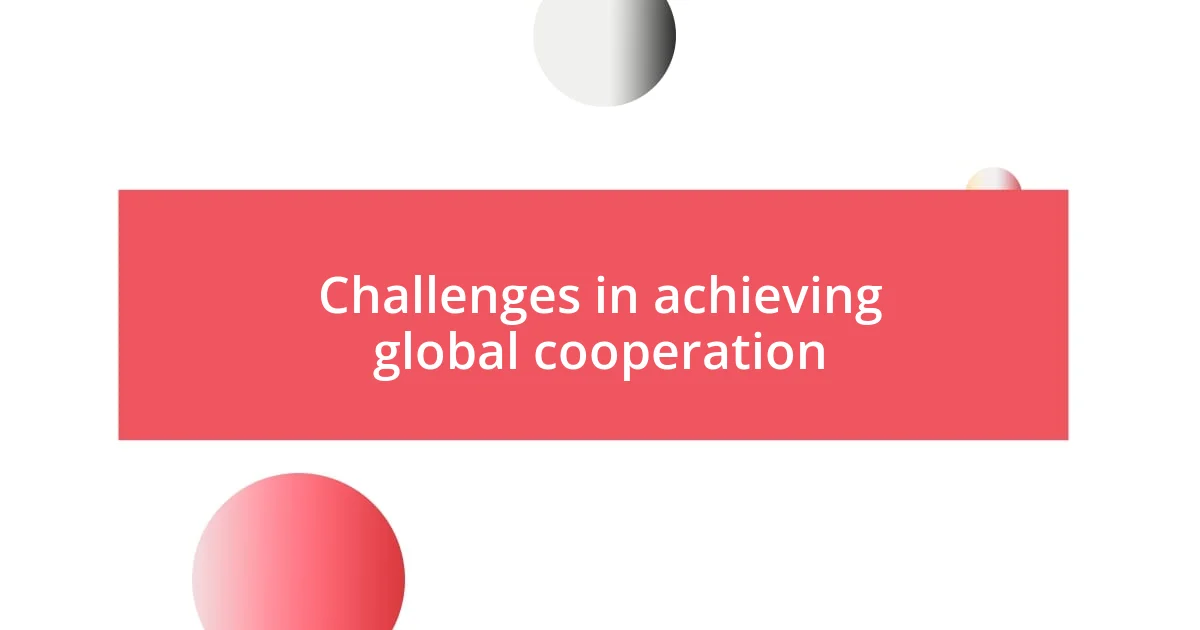
Challenges in achieving global cooperation
Achieving global cooperation is fraught with challenges that can be quite overwhelming. One major hurdle is the clash of national interests; countries often prioritize their own agendas over collaborative efforts. I remember a roundtable discussion where representatives struggled to find common ground on climate change policies. It was clear that while everyone acknowledged the urgency, differing economic priorities made it hard for them to unite on a shared strategy. How can we expect genuine cooperation when self-interests overshadow collective goals?
Another significant barrier is the cultural diversity prevalent across nations. Each culture has its own values, communication styles, and problem-solving approaches, which can lead to misunderstandings. I once participated in an international conference where a misinterpretation of a gesture led to an uncomfortable silence. It emphasized the importance of cultural sensitivity, making me wonder—how often do we overlook the nuances that can either bridge or widen gaps in cooperation?
Lastly, there’s the challenge of unequal power dynamics on the global stage. Some nations have far more resources and influence than others, which can create imbalances in negotiations. I’ve witnessed this firsthand in forums where smaller countries hesitated to voice their concerns, fearing backlash from more powerful counterparts. This imbalance raises an important question: can meaningful cooperation exist when some voices are marginalized? It was a sobering realization for me, highlighting the need for more inclusive platforms that empower all nations to participate equally.
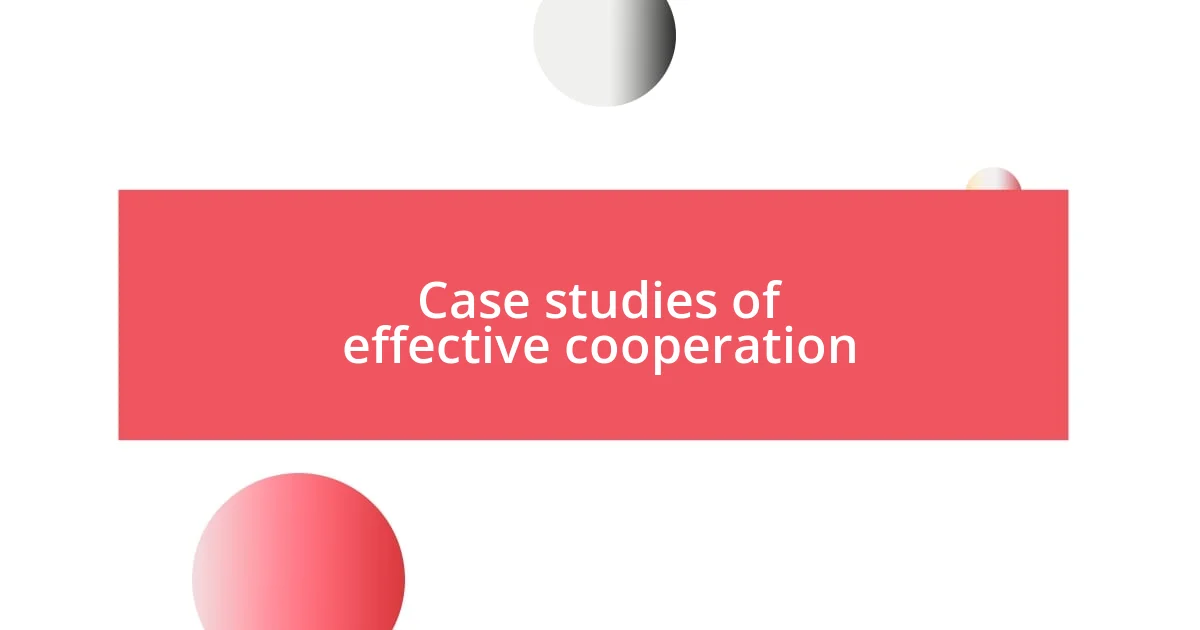
Case studies of effective cooperation
Fostering global cooperation has often been illuminated through compelling case studies. Take the European Union, for instance—here’s a fascinating example. Countries that were once bitter rivals found common ground after World War II, primarily through economic collaboration. It’s remarkable to witness how shared interests in trade and security can transform historical enmities into partnerships. I can’t help but think about how this model might inspire other regions to pursue cooperative ventures. Wouldn’t it be incredible if more nations could prioritize mutual benefits over past grievances?
In another instance, consider the Global Climate Change Summit. Leaders from around the world came together to forge agreements despite varying priorities and concerns. I remember watching a session where representatives passionately voiced both the urgency of climate action and the need for economic consideration. The emotion in the room was palpable, reflecting a collective realization that cooperation is vital for our planet’s future. This was a beautiful reminder of how shared goals can unite us, even when our paths and policies differ. How might our world change if we approached all global issues with the same determination and collaborative spirit?
Lastly, the World Health Organization showcased effective global cooperation during the COVID-19 pandemic by coordinating responses across nations. I recall seeing countless stories of countries sharing resources and knowledge to address the crisis. It stirred a sense of hope; it highlighted our interconnectedness and the power of solidarity. Isn’t it inspiring to think about how collective efforts in times of need can forge bonds that last beyond the crises? This kind of cooperation demonstrates the essence of humanity working hand in hand, transcending borders for a common cause.

Future trends in global partnerships
Future partnerships are likely to lean heavily on technology as a bridge for collaboration. In my experience, the rise of digital tools has transformed how nations communicate and work together. There’s something astonishing about real-time data sharing and virtual meetings, enabling stakeholders from different parts of the world to connect instantly. Imagine being able to brainstorm solutions to global issues without geographical constraints—how could that reshape our approach to partnerships?
Sustainability will also become a key focal point in future partnerships. I attended a recent summit where it was striking to see sustainability commitments overtaking traditional economic agendas. The passion people expressed for renewable energy and ecological preservation was electrifying. Why wait for crises to ignite our drive for change? I wonder if we will soon witness a wave of partnerships formed purely out of a shared vision for a sustainable future, transcending mere economic gains for a more profound cause.
Lastly, inclusivity will play a pivotal role in shaping global alliances. I remember being part of a workshop where diverse voices from various backgrounds were encouraged to share their perspectives on social justice. The atmosphere was electric, as each participant brought unique insights that enriched the dialogue. What if every partnership were built on a foundation of inclusive decision-making? The prospect excites me, as it could herald a new era where marginalized voices are not just heard but valued, enhancing the effectiveness of global cooperation.
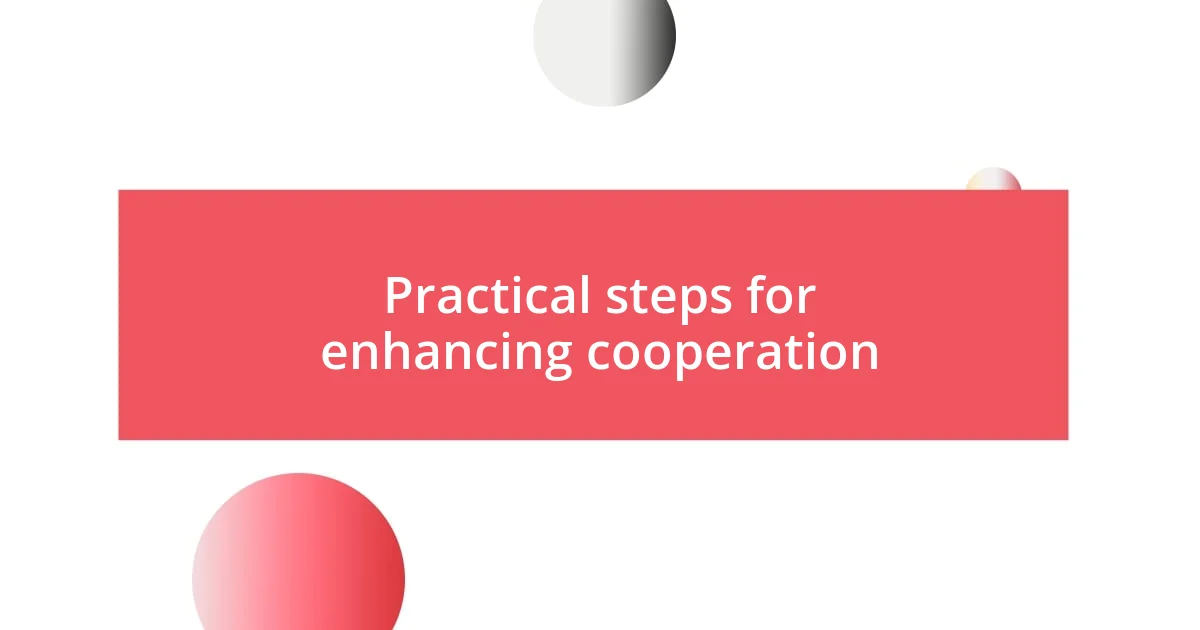
Practical steps for enhancing cooperation
One of the most effective ways to enhance cooperation is to establish clear communication channels. I recall attending an international conference where participants engaged in real-time discussions through a dedicated app. This platform allowed everyone to voice their concerns and solutions instantly, fostering an environment of collaboration. It made me wonder: what if every partnership utilized similar technology to ensure every voice is heard? Improving communication can truly break down barriers and lead to more productive collaboration.
Another practical step is to organize collaborative workshops that bring various stakeholders together to brainstorm solutions. I had a transformative experience at a workshop aimed at addressing local environmental issues, where diverse participants—from government officials to community members—shared their insights. The synergy generated from these different perspectives opened pathways I never thought possible. Imagine how powerful it could be if similar workshops were held on a global scale, creating a melting pot of ideas that drive actionable cooperation.
Finally, promoting accountability can significantly strengthen alliances. Reflecting on my experiences with collaborative projects, I found that transparency in sharing responsibilities fostered trust among all parties involved. For instance, during a community project, setting up a system to report progress and setbacks encouraged everyone to stay committed. Wouldn’t it be fascinating if nations adopted similar accountability measures in their partnerships? Holding each other accountable could not only enhance trust but also elevate the collective outcome of global cooperation.










